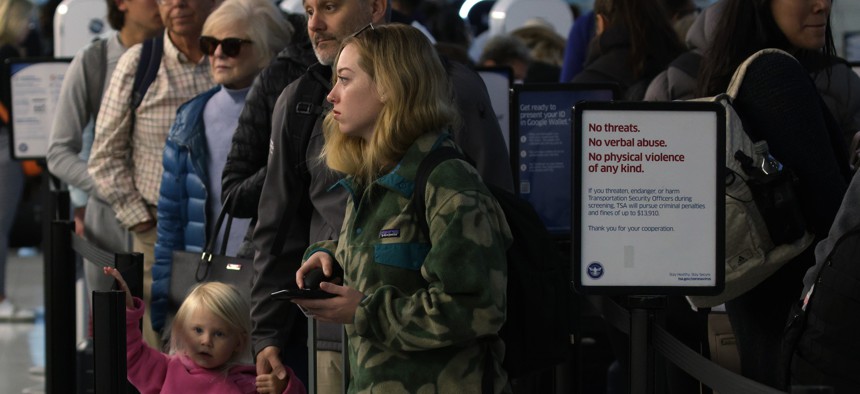Senators move to ban TSA’s facial recognition screenings

Thanksgiving travelers wait in a security line in Ronald Reagan Washington National Airport in Arlington, Va. on November 21, 2023. Alex Wong/Getty Images
The bipartisan proposal cited concerns about the government’s collection of biometric data.
A bipartisan group of senators introduced legislation this week to block the Transportation Security Administration from using facial recognition technology at U.S. airports, due to concerns about the agency’s collection of biometric data from travelers.
The lawmakers said their proposal — known as the Traveler Privacy Protection Act — would “empower travelers in the United States with control over their privacy” in response to TSA’s pilot of a facial recognition screening program.
The bill was introduced on Wednesday by Sens. John Kennedy, R-La., and Jeff Merkley, D-Ore., and is co-sponsored by Sens. Ed Markey, D-Mass., Bernie Sanders, I-Vt., Roger Marshall, R-Kan., and Elizabeth Warren, D-Mass.
According to a legislative summary, the bill would bar TSA from expanding its use of facial recognition and repeal the agency’s authority to experiment with the technology. TSA would also be required to “end its facial recognition program and dispose of facial biometrics within 3 months.” Any future use of the technology by the agency would also require congressional approval.
“I am concerned that we have no clue where this data is going, and thousands of Americans every day are not aware of their option to decline to have their photo taken by a government agency every time they go to the airport,” Marshall said in a statement. “The potential for these images to be used to violate American’s civil liberties is greatly concerning.”
TSA began testing facial recognition technology at Los Angeles International Airport in 2018 as part of a pilot initiative “to automate the identification and boarding pass verification process.”
The agency released a biometrics roadmap in October 2018 that outlined its plan for expanding the pilot program. A TSA spokesperson told Fast Company this summer that the agency plans to extend its pilot to roughly 430 U.S. airports over the next several years.
Merkley called TSA’s program “a precursor to a full-blown national surveillance state” and said that “no government should be trusted with this power.” Citing his own experience of declining the screening process at the airport, Merkley also accused the agency of making it unclear that travelers “are able to opt out of using facial recognition technology.”
Merkley and several of his Democratic colleagues in the Senate previously pressed TSA to halt facial recognition screenings, writing in a February letter to the agency’s administrator that “increasing biometric surveillance of Americans by the government represents a risk to civil liberties and privacy rights.”
The bill has already received support from several prominent advocacy groups that cited similar privacy and civil rights concerns, including Public Citizen, the American Civil Liberties Union and the Electronic Privacy Information Center — or EPIC.
“The privacy risks and discriminatory impact of facial recognition are real, and the government's use of our faces as IDs poses a serious threat to our democracy,” Jeramie Scott — EPIC’s senior counsel and the director of the nonprofit’s project on surveillance oversight — said in a statement.
TSA, however, has maintained that travelers are free to opt out of the screening process and that collected biometric data is not saved unless there is a specific reason to do so.
In a factsheet on its use of facial recognition technology, TSA said travelers “may voluntarily agree to use their face to verify their identity during the screening process by presenting their physical identification or passport” and that “photos are not stored or saved after a positive ID match has been made, except in a limited testing environment for evaluation of the effectiveness of the technology.”
The agency also said it is testing the technology “to improve and perhaps automate the identity verification portion of the [boarding] process for passengers, not for law enforcement or immigration enforcement purposes.”
This week’s bill marks the latest congressional effort to limit the use of facial recognition technologies over privacy and civil rights concerns.
A group of House Democrats — led by Rep. Ted Lieu, D-Calif. — introduced legislation in October that would drastically roll back law enforcement’s use of the technology to “situations when a warrant is obtained that shows probable cause that an individual committed a serious violent felony.”






